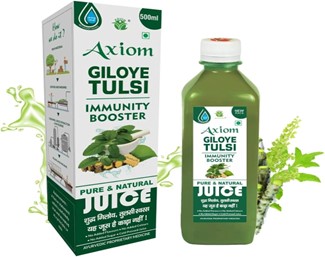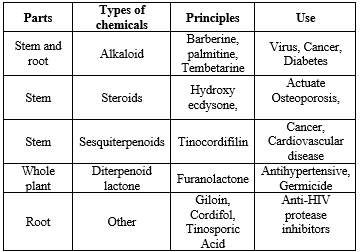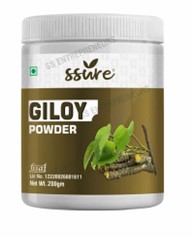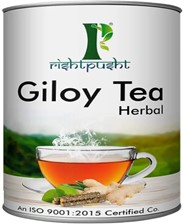Natural products with medicinal value are gradually gaining importance in clinical research due to their well-known property of no side effects as compared to drugs.
Tinospora Cordifolia common name is "Giloy” or “Guduchi". The Ayurvedic herb Giloy (Tinospora Cordifolia) is found throughout China and the Indian subcontinent. One of the beneficial medicinal plants is Giloy (Tinospora Cordifolia), which can be consumed either raw or prepared. The future scope of the re- view remains in exploiting the biochemical and signalling pathways affected by the compounds isolated from Tinospora so as to enable new and effective formulation in disease eradication. This review focuses on the medical use of the Giloy plant. Various parts of the Giloy plant can be used. [1]

Botanical name:
Tinospora cordifolia
Sanskrit name:
Amrita, Guduchi
English:
Heart leaved moonseed?
Marathi name:
Gulvel
Family: Menispermaceae
Plant part used:
root, stem, leaves
Tinospora cordifolia is a deciduous climbing, large shrub which belongs to the family Menispermaceae. This plant is widely distributed in India, Burma, China, Myanmar and Sri Lanka.The entire plant is utilized both alone and in conjunction with other plants in folk and Ayurvedic medicine. Tinospora Cordifolia has been listed by the -National Medicinal Plant Board, New Delhi, Government of India, as one of 29 highly priority medicinal species of agroclimatic zone 8 (Rajasthan, Uttar Pradesh, and Madhya Pradesh), due to its high demand. It can survive in different kinds of soils from acidic to basic with average moisture. Stems of the plant are moist and thick, having large aerial roots, emerging from the branches with varying thickness; younger stem are green coloured with smooth surfaces, while older stems being light brown coloured. [1][2][3]
MORPHOLOGICAL AND PHYSIOLOGICAL CHARACTERISTICS:
morphological and physiological characters of the plant, including plant length, stem diameter, growth habit, floral morphology, flower color, stomatal density, trichomal density, lenticels density, petiole length, plant biomass, and other characteristics of the plant and diversity in the genetic components identified by markers have indicated the diversity in the medicinal plant which has profound importance for efficient and effective management of plant genetic resources.
Pharmacological Activity of Giloy Plant:
1. Anti-allergic:
Tinospora cordifolia is mainly used for the treatment of asthma and the juice is also employed for the treatment of kasa (cough) and swasa (Asthma. Giloy has anti-inflammatory, allergy, and anti-histaminic properties. It works well to treat flu, colds, and fever.
The anti-allergic and bronchodilator properties of an aqueous extract of the stem evaluated on:
- Guinea pig: histamine-induced bronchospasm
- Mice: capillary permeability
- Rat: mast cell disruption
It significantly decreased bronchospasm, capillary permeability and reduced the number of disrupted mast cells
2. Immunomodulatory Activity:
Alcoholic and aqueous extracts of T. cordifolia were reported to have beneficial effects on the immune system .The Giloy also used in the treatment of coronaviruses because Giloy built a strong immunity in human body against COVID-19. Fresh Giloy juice aids in boosting defence mechanisms. It promotes macrophage activity, which aids in quick recovery. Macrophages are cells has the potential to inhibit the pain and fight against the infection. Giloy increase the immune power and promotes bodily resistance.
3. Anti-HIV Activity:
Giloy is an exceptionally viable spice in the treatment of HIV.-It supports the safe framework and helps in the creation of fresh blood cells. Kalikae et al., showed that the root extract of T. cordifolia affects the immune system of HIV positive patient. Anti-HIV effects to reduce eosinophil count, stimulation of B lymphocytes.
4. Anti-Tumors Activity:
The second-leading cause of death in the world is cancer. The anticancer activity of T. cordifolia has been reported against various tumors or cancers. The effect of Giloy plant is better than doxorubicin treatment which is used in cancer treatment .Giloy inhibits oral cancer cells can a dose-dependent manner by inducing apoptosis and attenuating epithelial-mesenchymal transition.
- Anti-Diabetic Activity:
This plant is known to have been mentioned in the ancient Indian texts of Ayurveda as Madhunashini, which in Sanskrit literally means 'destroyer of sugar. ‘This plant is known to have been mentioned in the ancient Indian texts of Ayurveda as Madhunashini, which in Sanskrit which means 'destroyer of sugar. Giloy has the hypoglycemic property to reduce blood sugar levels in diabetic patients. Giloy juice benefits diabetic patients to reduce lipid levels and nerve problems. Giloy benefits by promoting insulin secretion inhibiting gluconeogenesis (production of glucose) and glycogenosis (breakdown of glycogen-glucose reserve) which helps to regulate blood glucose. Giloy can be helpful in both diabetes 1 and 2. Giloy helps in improving digestion, which is a crucial aspect in managing diabetes
6. Anti-Osteoporotic Activity:
Alcoholic extract of Tinospora cordifolia have been shown to stimulate the growth of osteoblasts, increasing the differentiation of cells into osteoplastic lineage and also increasing the mineralization of bone like matrix.
7. Anti-microbial activity:
The methanol extracts of Tinospora cordifolia have been reported to have potential against microbial infections.[78] The anti-bacterial activity of Tinospora cordifolia extracts has been assayed against Escherichia coli, Staphylococcus aureus, Klebsiella pneumoniae, Proteus vulgaris, Salmonella typhi, Shigella flexneri, Salmonella paratyphi, Salmonella typhimurium, Pseudomonas aeruginosa, Enterobacter aerogene, and Serratia marcesenses (Gram-positive bacteria).[4][5][6][7][8][9]
Benefits of Giloy:
1. Benefits of Giloy for Dengue:
It is useful in managing dengue fever. It has anti-inflammatory and antipyretic (that reduce fever) properties. Regular intake of Giloy during dengue helps in improving the immune system. It also helps in increasing platelet count and speed up recovery process.
Dosage:
Not more than 250mg in children
2. Benefits of Giloy for Fever:
Giloy is an anti-inflammatory, antipyretic (that reduce fever) herb and is useful in building up the immune system and the body's defense against infections. Giloy helps in reducing fever due to its Javarghana (antipyretic) property. As enhances the activity of macrophages (the cells responsible for fighting foreign bodies as well as microorganisms) and thus helps in early recovery. As per Ayurveda, there are two factors leading to high fever, first is Ama and second is any foreign particle or organisms. Giloy helps reduce fever by improving digestion and absorption due to its Deepan (appetizer) and Pachan (digestive) properties which in turn prevents the formation of Ama.
Tip:
- Take 2-3 teaspoon of Giloy Juice.
- Add the same quantity of water to it and drink it on an empty stomach in the morning once a day dose.
- Benefits of Giloy for Diabetes:
Giloy might be useful in managing diabetes by improving blood glucose levels. It also helps to manage diabetes-related complications such as ulcers, wounds, kidney damage due to its antioxidant and anti-inflammatory properties.
Giloy helps control high blood sugar level and various diabetic complications by improving digestion and absorption due to its Deepan (appetizer) and Pachan (digestive) properties which in turn prevents the formation of Ama.
Dosage:
Take 1/2 teaspoon of Giloy Churna twice a day with water after taking lunch and dinner.
4. Benefits of Giloy for Liver disease:
Liver injury due to an overdose of alcohol can be managed by using Guduchi Satwa, an Ayurvedic formulation prepared from Giloy. It acts by lowering total cholesterol level in the liver. It also improves the level of antioxidant enzymes (reduces damage by free radicals) and oxidative-stress markers thereby enhancing overall liver function.
Dosage:
- Take 2-3 teaspoon of Giloy Juice.
- Add the same quantity of water to it and drink it on an empty stomach in the morning once a day.
- Benefits of Giloy for Diarrhea:
Giloy helps to reduce digestion related problems like indigestion, hyperacidity, and flatulence due to its Pachan (digestive) properties.
Dosage:
- Take 1/4-1/2 teaspoon of Giloy powder.
- Add to 1 glass of lukewarm water and mix well.
- Have it after lunch and dinner.
5. Benefits of Giloy for High cholesterol:
Giloy helps to control high cholesterol level in the body by improving the metabolism and eliminating toxins from the body which are responsible for high cholesterol. This is due to its Deepan (appetizer), Pachan (digestive) nature and Rasayana (rejuvenating) properties.
Tip:
- Take 2-3 teaspoons of Giloy juice.
- Add to 1 glass of water and drink it.
6. Benefits of giloy for skin:
Giloy is loaded with antioxidants, it can prevent oxidative stress and that in turn slows down the ageing of the skin. Giloy can also improve blood circulation which gives a natural glow to the skin.
How to use – Add a stick of giloy to a cup of milk and boil it. When the beverage cools down a little, drink it. Milk too can benefit the skin in many ways and together, milk and giloy can do wonders for your skin. [10]
Interaction with other plant:
Neem with Giloy:
The Giloy climbers grow on neem tree. Neem Giloy is largely advised for the cure of illnesses related to weak immunity system, inflammation, and impure blood in the body. It’s Anti-pyretic, anti-inflammatory, and blood purification properties have been scientifically proven in the cure of cancer
Ashwagandha with Giloy:
Ashwagandha is therapeutic herb that when combined with Giloy helps in the effective treatment of severe viral infections and recommended for diseases like coronavirus, swine flu, etc. 1381, (Giloy sticks are beneficial in treating coronavirus by arresting the spread and growth of corona virus. The presence of a potent compound in Ashwagandha as "with none" improves endurance, agility, energy, and stamina in a person.
Tulsi with Giloy:
Giloy when combined with natural Tulsi helps to balance pitta, strengthen lungs, cure respiratory infection and cure skin disorders in the body. It enhances the immunity system and effectively cures jaundice, seasonal viral infections, intestinal disorders, constipation.
Drawback:
- It can leave you constipated:
Giloy is known to improve the digestive system, but some people experience constipation due to consuming too much of it. Please consult your doctor if you observe changes in your bowel movements after consuming the herb.
- Certain autoimmune diseases can get triggered.
Giloy is particularly famous for its immunity-boosting properties. However, consuming too much of it can over-stimulate your immune system which can lead to complications. So, it is best to avoid giloy if you have been diagnosed with auto-immune diseases such as lupus and rheumatoid arthritis.
- It might be harmful to pregnant women.
Experts suggest that pregnant women or those who are breastfeeding should avoid consuming giloy. Its impact on this demographic hasn’t yet been medically established. But, it is best to listen to experts and skip giloy if you’re pregnant.
- In condition of hypoglycaemia. [11]
Marketed Product:
- Giloy Tulsi Juice
- Giloy Syrup
- Giloy Amrit Tablet
- Giloy Powder
- Anti-grey Shampoo
- Giloy Tea

Giloy Syrup

Giloy Tulsi Juice


 Sarthak Ramesh Yadav*
Sarthak Ramesh Yadav*
 Vaishali. V. Kadam
Vaishali. V. Kadam
 Bhagyashri borade
Bhagyashri borade
 Vaishnavi walhekar
Vaishnavi walhekar






 10.5281/zenodo.11403997
10.5281/zenodo.11403997